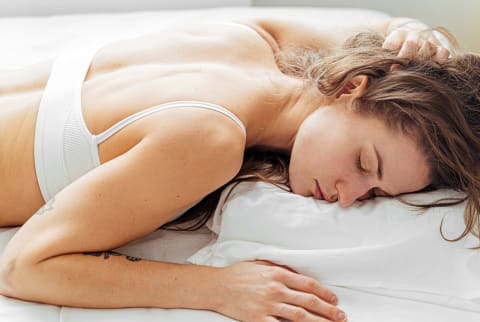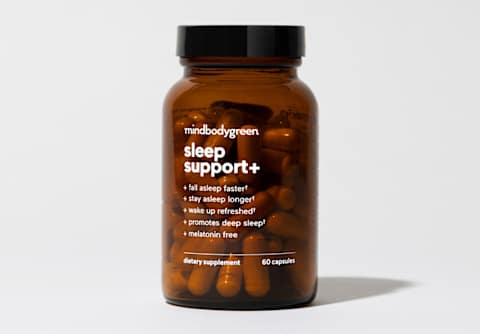Advertisement
I've Tried Everything To Sleep — This Melatonin-Free Supplement Is The Only Thing That Worked


Sleep has never come easy for me. Starting in high school, I had trouble turning my brain off at night. Instead, I would lie awake, my mind swirling with to-do lists and playing out best- and worst-case scenarios.
Eventually, I turned to watching TV in bed. I figured if I couldn't turn off my brain, I could distract it from spiraling until it was lulled to sleep with Grey's Anatomy reruns.
But after a few years, even that stopped working (unsurprising, knowing what the research says about how blue light disrupts sleep). So I turned to melatonin.
My experience with melatonin.
At first, melatonin delivered what I'd been looking for. Within 30 minutes of taking it, my eyes would start to get heavy and I'd feel that full-body fatigue that was so elusive. I'd always felt a vague sense of shame about being someone who watched TV in bed. I could never understand people who just turned off the lights, laid their head on their pillow, and drifted off to sleep. Now, I was one of them.
The downside of melatonin was that as fast as sleepiness came on, it was hard to turn off. I've never been one to wake with my first alarm, and when I took melatonin, it felt like even more of an uphill climb. I'd hold my phone in front of my face, willing the blue light to pull me out of my stupor, only to be dragged back under.
Other times, I found the sleep-inducing effects to be stronger than I'd like. I had to carefully time when I took my melatonin—within a half-hour or so of taking it, my eyes would start closing, whether I was ready for bed or mid-conversation.
When I learned that melatonin is a hormone available only via prescription in most other countries and that many experts warn against taking it long term, I decided it was time to try something else.
My experience with sleep support+.
Flash-forward and I'd just started working at mindbodygreen and figured I'd see what all the hype around sleep support+ was about. I'd never considered a melatonin-free sleep supplement, so I had my doubts.
The first night I took it, I didn't notice anything different right away. I did, however, drift off to sleep pleasantly, with little time spent lying awake, counting down the shrinking hours of sleep I could get before my alarm rang. I woke up energized but figured it was too soon to tell if it was a fluke. A few weeks later, I thought back to the sleep struggles that had inspired me to try sleep support+ and realized they felt distant and unfamiliar. I couldn't remember the last time I'd had anything but a good night's sleep.
How sleep support+ works.
Thanks to sleep support+'s calming formula, I was not only getting to sleep faster but experiencing noticeably higher-quality sleep.* After doing a little research, I learned that it was the blend of magnesium bisglycinate, a uniquely absorbable form of the essential mineral, and jujube, a fruit used in traditional Chinese medicine, that helped usher in that sense of calm and relaxation I'd come to know.* And to top it all off, sleep support+ delivers 100 mg of PharmaGABA®, a clinically studied neurotransmitter that improves sleep quality, leaving me refreshed come morning.*
How sleep support+ helps me wake up on my first try.
The real kicker came when I realized I couldn't remember the last time I'd snoozed my alarm. I've always had to set five to 10 alarms in three-minute increments, knowing I might not even remember turning off the first few. Now, I found myself having to pause my workout to turn off the last ones. Without even realizing it, I'd become the kind of person who could wake up on the first ring.
The takeaway.
As someone who's struggled with sleep for a decade now, I've tried everything—meditation, melatonin, you name it. After taking sleep support+, I don't think twice about whether sleep will come.* Learn more about the nonhormonal nightly sleep aid here.
